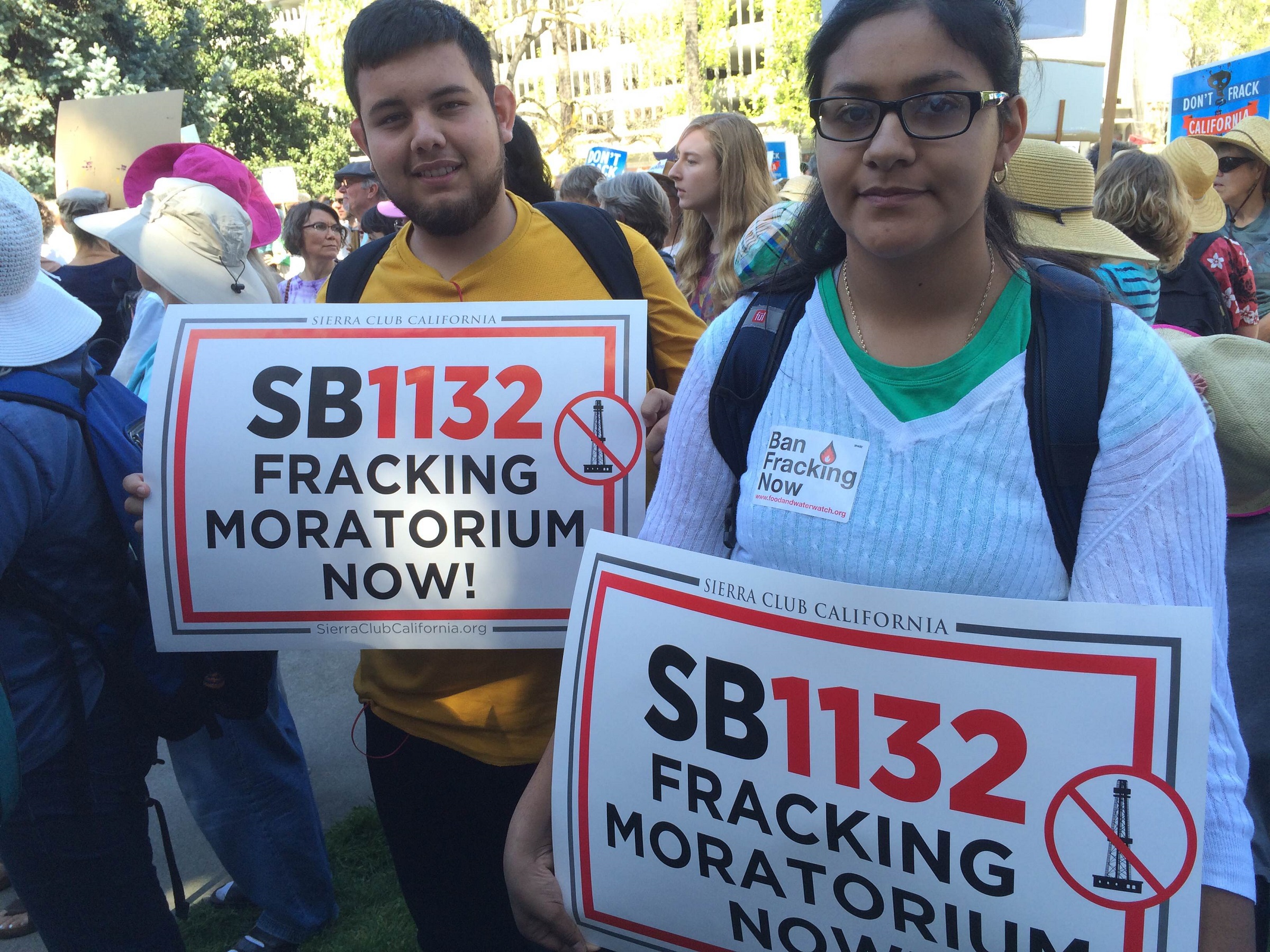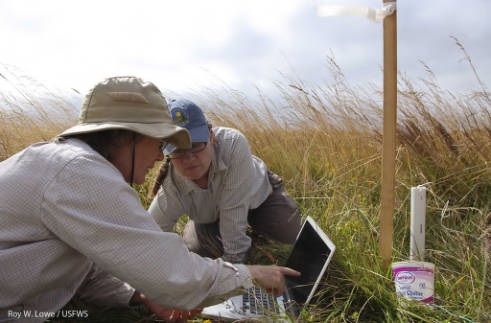
Fracking Moratorium Bill Fails, Other Paths Remain Open
Severe Drought Highlights Need to Manage Groundwater
Some Good, Some Bad in Legislative Energy Outcomes
June Hot Topics: No Taxpayer Subsidized Dams
Be a Clean Energy Pioneer!

Fracking Moratorium Bill Fails, Other Paths Remain Open
By Kathryn Phillips
Despite a strong push by a broad coalition that included environmentalists, environmental justice groups, labor unions, business interests, tribal organizations, and health organizations, Senate Bill 1132, the fracking moratorium bill, failed to clear the Senate.
The bill faced strong opposition from the oil industry. During its first vote on the Senate floor, the bill earned 18 votes, coming up three votes short of passage.
All Republicans voted “No” on the bill. The Democrats voting “No” were senators Cathleen Galgiani, Ed Hernandez, Lou Correa, and Norma Torres. Staying neutral on the bill—which effectively blocked passage—were senators Ricardo Lara, Richard Roth, and Ben Hueso.
During a second vote on the bill, Senator Marty Block, a Democrat from San Diego, shifted his support to a neutral position. Senator Hill missed the second vote and was listed as abstaining. The final vote, then, was 16 to 16, with five abstentions. Three senators who are on suspension, Rod Wright, Ron Calderon and Leland Yee, also were listed as abstentions on each vote.
In the last several months, a number of reports have noted that the oil industry has spent about $15 million in the state legislature in the last 15 months, including blocking efforts to halt fracking and acid stimulation. Such generous spending, combined with a late-hour decision by the California Building Trades Council to oppose SB 1132, produced high hurdles for the bill’s passage in May.
Other labor organizations devoted to public health and a sustainable economy in California, including the SEIU state council and the Communications Workers of America, helped lobby to pass the bill out of the senate. Unfortunately, their efforts, plus the efforts of our broad coalition and grassroots networks, weren’t enough to counter the building trades and the oil industry.
However, the loss in the senate was not unexpected and the bill produced a number of benefits. The moratorium bill drew statewide and national attention to the fracking debate in California, helped develop a broad coalition of supporters for pausing fracking in the state, and helped increase public support for a moratorium. Polling released a week before the vote showed that 68% of voters support a statewide moratorium.
The bill also helped unify and organize environmental voices on the fracking issue. Many of those organizations, including Sierra Club, have helped develop local moratoria and ban initiatives around the state. Sierra Club California’s fracking campaign will now turn more attention to other tools in the fight to halt dangerous fracking and acid well stimulation in California, including the local initiatives, the press to persuade the governor to use his administrative tools to pause fracking, and legal action.
Notably, all of these efforts send a signal to investors that California is not a safe place to bet on big dollar returns on fracking operations. It’s much safer—and smarter— to invest in California’s clean energy industry.
 Severe Drought Highlights Need to Manage Groundwater
Severe Drought Highlights Need to Manage Groundwater
By Annie Pham
As the severe drought plagues California, policymakers have been pushed to address the third-rail of water policy: better managing and cleaning up groundwater statewide.
In a normal year, 40 percent of the total water use in California comes from underground and this number spikes sharply during drought years. According to the Department of Water Resources, groundwater levels have been sucked dangerously low since 2008 as water users have increased reliance on aquifers.
Without proper management, overdraft from groundwater basins can lead to subsidence, poor water quality, and seawater intrusions. Groundwater also naturally discharges to the surface and the interruption of that natural flow will result in adverse impacts for any wildlife, environment, and activities that depend on the water source.
Amazingly, even though California has always been touted as a progressive state, it is the only state that does not have a mandated statewide groundwater management policy. Other than twenty or so basins that were adjudicated by the courts and assigned water masters to regulate extraction quantity, groundwater management in California remains largely voluntary.
However, after experiencing an incredibly dry year and anticipating another one ahead, Governor Jerry Brown’s administration decided earlier this year to put groundwater management front and center on the 2014 agenda. The administration’s first action was provision of funding for the California State Water Resources Control Board to hire additional staff to work on groundwater. The administration has also convened meetings and workshops with consultants and stakeholders to seek suggestions for a comprehensive groundwater management plan.
Most recently, the administration released a draft proposal for legislation on groundwater management. There are currently two vehicles for either all or pieces of the proposal to make their way through the normal legislative process: Senate Bill 1168 by Senator Fran Pavley; and, Assembly Bill 1739 by Assemblymembers Dickinson and Rendon. There is also a possibility that the budget process will include a special bill to address groundwater.
The Governor’s proposal emphasizes empowering local governments to organize groundwater management entities, and then develop plans for sustainable groundwater management. The failure of doing so may trigger state intervention.
Club staff advocates are actively participating in stakeholder groups following the groundwater effort. Our key concern is that any groundwater policy developed be effective and not voluntary. It’s time for California to join the rest of the country in valuing and protecting groundwater.
 Some Good, Some Bad in Legislative Energy Outcomes
Some Good, Some Bad in Legislative Energy Outcomes
By Edward Moreno
The first half of the 2014 legislative session was a great one for energy efficiency, and positive for aspects of renewables. But the positives were muted by the big utilities’ second attempt to undercut community energy self-reliance.
At the beginning of the year, seven good efficiency bills were introduced. These ranged from bills establishing new appliance efficiency targets to bills providing finance mechanisms for efficiency upgrades to rentals, small businesses and California’s colleges and universities. Most of those bills managed to pass through their houses of origin.
On the renewable side of things, a bill to boost rooftop solar energy by improving the local permitting process for solar system installations, AB 2188 (Muratsuchi), passed the Assembly and moved to the Senate. However, renewable energy faces a setback if another bill, AB 2145 (Bradford), which passed the Assembly, continues moving forward in the Senate.
Several years ago California’s legislature paved the way for more communities to take energy generation into their own hands by developing Community Choice Aggregation (CCA) programs.
A goal was to ensure that local public agencies would be able to procure cleaner and cheaper renewable energy on behalf of their communities as an alternative to a for-profit utility monopoly. CCAs can save customers money while bringing California closer to meeting greenhouse gas emissions reduction goals.
Over the last several weeks, CCA’s had much of the legislature scratching their heads asAB 2145, a utility-backed choke-hold on consumer choice and environmental protection, slimed its way through the Assembly. That bill effectively starves the CCAs of customer base and buying power.
Sierra Club along with a diverse coalition of opponents, including CCAs, solar companies, businesses, and municipal utilities, bombarded the legislature with information on CCAs and the sinister nature this bill.
Unfortunately, even though our efforts kept about two dozen assembly members off the bill, the bill passed with a solid margin. You can see the final Assembly vote count here. Now the bill moves to the Senate, where the coalition will continue to mount efforts to protect the environment and consumer choice and oppose AB 2145. Call your Senator and urge a “NO”vote on AB 2145 when it comes before him or her. For more information visithttp://www.no2145.org/
June Hot Topics: No Taxpayer Subsidized Dams
If you have an opportunity to communicate with legislators, make sure they know that any water bond must not be a boondoggle for big dam builders. Voters won’t stand for that.
That means the bond must include strong, environmentally protective criteria and legislative oversight for any funds for storage projects.
You can reduce California’s carbon emissions by the equivalent of taking your car off the road for 20 years, simply by going solar.
When you go solar with a company that is a trusted Sierra Club partner, you get a special discount and at the same time, send funds back to Sierra Club California. It’s a win-win-win!
Go to sierraclub.org/solarhomes for more information and to get started.
Follow Us:
  |
Thank you for being a part of our work! You may securely donate online or by sending a check to Sierra Club California at 909 12th Street, Suite 202, Sacramento, CA 95814.
